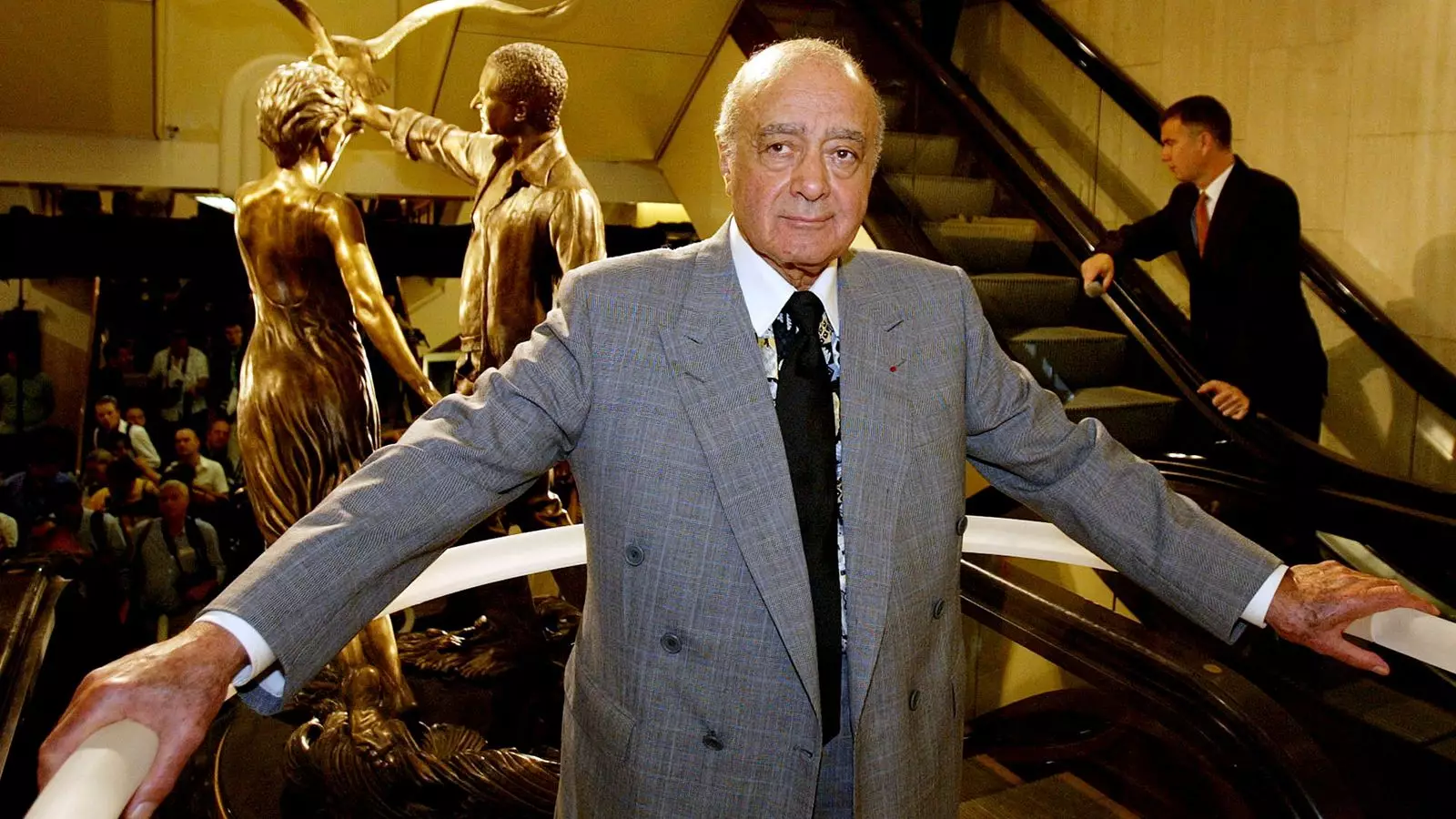The recent allegations against Mohamed Al Fayed, the former owner of Harrods, have unveiled a dark and troubling narrative about abuse and exploitation that resonates with other high-profile cases in recent history. Accusations from more than 20 former female employees have painted a grim picture of a “predator” who allegedly thrived on the naïveté and vulnerability of young women. Lawyers representing these victims have drawn parallels to cases involving notorious figures such as Jimmy Savile and Harvey Weinstein, citing the systematic nature of the abuse that took place under the very roof of one of the world’s most famous department stores.
Central to these allegations is the harrowing testimony of a woman identified as Natacha, who recounted her traumatic experiences as a 19-year-old new employee at Harrods. Her story, filled with fear and survival, reflects a broader pattern of predation where young and impressionable individuals were targeted, manipulated, and abused. The assertion that a prominent figure like Al Fayed could operate unchecked within a corporation raises significant concerns about institutional failure and a corporate culture that may have enabled such predatory behavior.
The legal team representing the alleged victims has emphasized that the abuses were not isolated incidents but part of a larger “vast web of abuse” that spanned years. This web, as indicated by the testimonies, included assaults at various locations, with some victims as young as 15 or 16. The disturbing revelations that employees were subjected to invasive examinations, including sexual health screenings, suggest a premeditated effort to exploit their vulnerabilities rather than a mere failure of oversight.
Dean Armstrong KC, a prominent lawyer involved in the case, has called out what he describes as an “abject failure of corporate responsibility” on Harrods’ part. It raises questions about the ethical obligations employers have toward their staff, particularly in environments where power dynamics can lead to abuse. The allegations suggest a culture that not only tolerated but perhaps condoned such behavior, leaving victims without recourse and creating an environment of fear and silence.
In light of these allegations, Harrods publicly condemned Al Fayed’s actions, stating they are “utterly appalled” by the accounts of abuse. Furthermore, they’ve expressed a commitment to rectify past wrongs by inviting former employees to come forward with their experiences. But the sincerity of such statements is put to the test: can a company transform its culture when its history is tainted by such allegations?
The response from Harrods is significant, suggesting an awareness of the need for a drastic shift and a proactive approach to safeguarding employees today. The assurance that “the Harrods of today is a very different organization” seeks to distance the current ethos from the troubling legacy of Al Fayed’s tenure. However, it remains to be seen whether this new commitment will translate into meaningful change or if it will simply serve as public relations maneuvering.
The complexities surrounding the legal proceedings against Al Fayed, especially considering the historical nature of the allegations, pose significant challenges. In 2015, allegations against him were investigated, but no charges were filed. The recent resurgence of accusations, however, has revived hopes for justice among the victims. The acknowledgment from the Metropolitan Police of ongoing investigations lends some credence to the belief that systemic issues are being critically assessed.
Nevertheless, the legal journey for survivors to find justice remains fraught with difficulty. Many victims may feel disheartened by the potential lack of accountability, especially considering the power and influence wielded by Al Fayed during his life. These difficulties underscore the urgent need for reforms in how institutions handle allegations of abuse, prioritizing victim support and the establishment of robust preventive measures.
The allegations against Mohamed Al Fayed should serve as a critical wake-up call, not just for Harrods but for all corporations that have the potential to foster an environment where abuse can thrive. The testimonies of the survivors demand acknowledgment and action, highlighting a collective responsibility to protect the vulnerable in workplaces and beyond.
As the discussions surrounding these revelations continue to unfold, one can only hope for a future where such abuses are not only brought to light but also met with accountability and decisive action against those who perpetrate them. The horrifying accounts of Al Fayed’s alleged behavior compel society to reevaluate its own systems and structures, ensuring that the voices of the victims are amplified, validated, and ultimately lead to meaningful change.


Leave a Reply